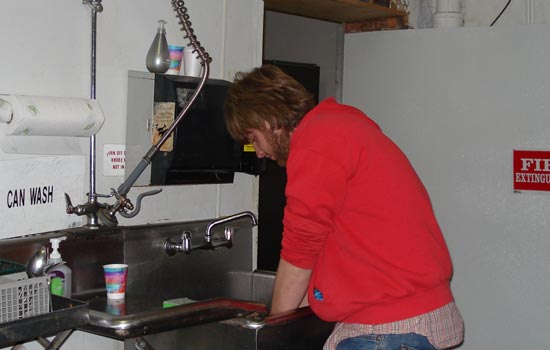Sustainability students focus on local homeless
Submitted photograph
Jim Cezo, president of RIT’s Engineers for a Sustainable World, conducts preparations for an evening meal at St. Joseph’s homeless shelter.
While the term “sustainability” is often used to define efforts to improve the environment, there is a growing understanding of the need for sustainable development in numerous cultural and societal areas. This concept includes addressing acute social issues such as homelessness and the services available to this population.
According to the Alliance to End Homelessness, more than 700,000 Americans were homeless in 2007, 41 percent of which were families. In Rochester, the U.S. Department of Housing and Urban Development estimates there are more than 1,000 families who are considered homeless, including more than 400 with children.
Within the past several years, a group of RIT students came together to form a local chapter of Engineers for a Sustainable World with the goal of promoting the social and environmental aspects of sustainability in the Rochester region and communities around the globe. One of the group’s central programs has been a partnership with Rochester’s St. Joseph’s homeless shelter.
The group volunteers weekly at the shelter, assisting with their daily meal program, which serves more than 100, as well as cooking evening meals for the organization’s 12 residents. Students are also preparing an energy audit of the shelter’s facilities to reduce energy use and lower heating and electricity costs.
“Most of us got involved with Engineers for a Sustainable World because we wanted to make our community a better place,” notes Jim Cezo, president of the RIT chapter. “We all get a lot out of our work with St. Joseph’s because we see the positive impact it has on people’s lives and society as a whole.”
“The assistance of RIT has been incredibly helpful in enhancing the services we can provide,” adds Ralph Hemmerich of St. Joseph’s. “We have a small staff and finite resources so the assistance with meals as well as the group’s work with energy efficiency has helped us better address the needs of the homeless population.”
The group originally found out about the work of the shelter through Sarah Brownell, a graduate of RIT’s mechanical engineering program, who now works for the organization. They have also received assistance from faculty advisors Brian Thorn and Andres Carrano, who are helping to conduct the energy audit and providing ideas for additional energy efficiency and cost reduction opportunities.
“This group of students has worked very hard to provide quality assistance to St. Joseph’s at a time when most are also taking classes and working full- or part-time jobs,” says Thorn. “Their dedication exemplifies the best aspects of social sustainability and the impact it can have on communities.”














